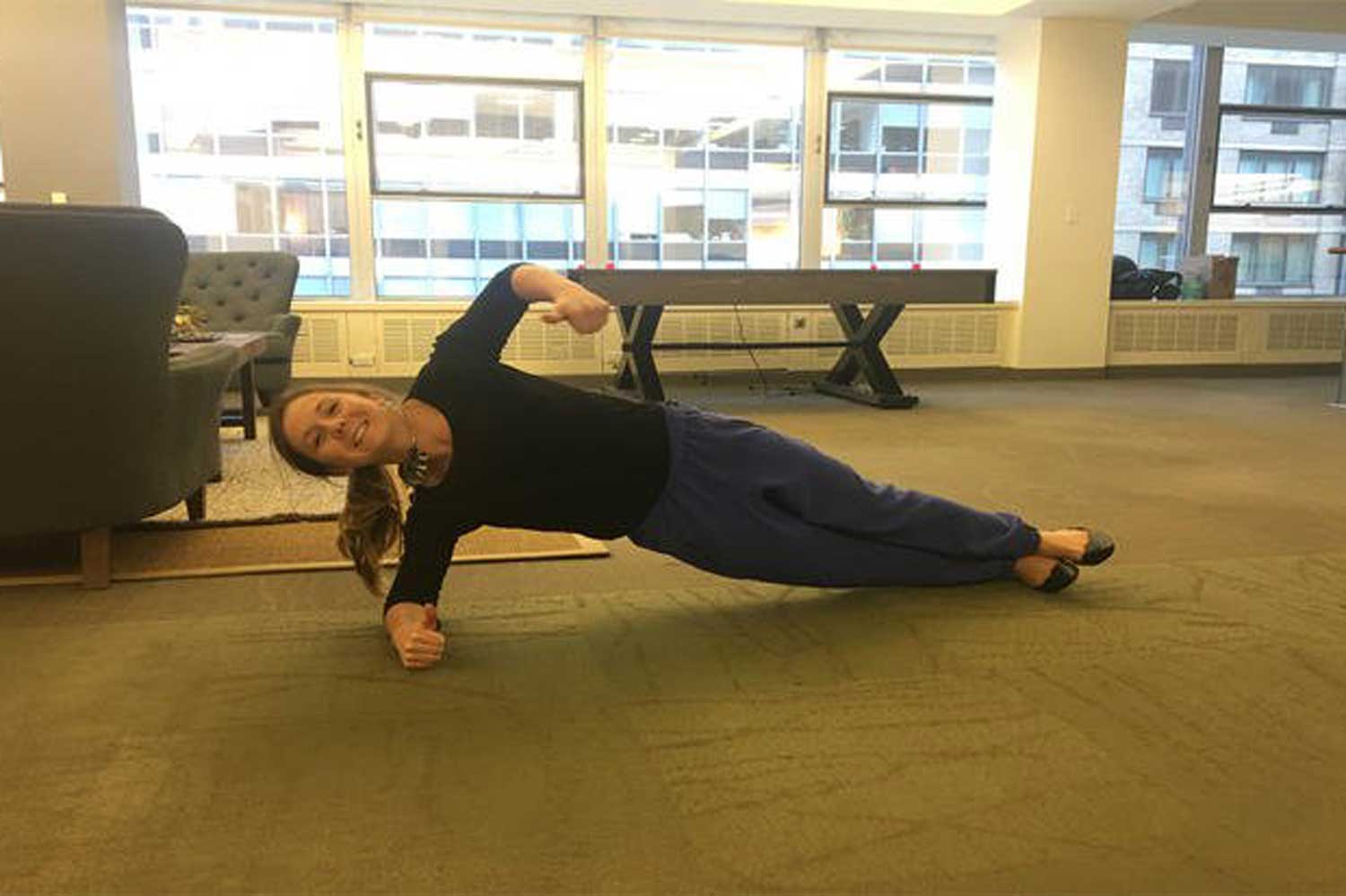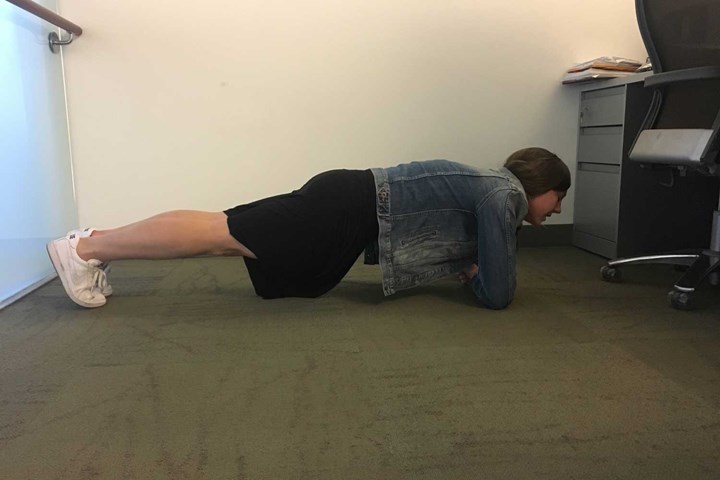
I recently started my first-ever desk job, working 9-5 primarily seated and staring at a computer screen, for this very magazine. Don’t get me wrong; the work itself is a dream job. But before this, I was a full-time student, constantly on the go, biking or walking (or sprinting, depending on how late I slept in) from class to work to the gym to the grocery store and back to class. But now? Butt and eyeballs, meet swivel chair and computer screen.
After catching myself having not moved anything but my fingers for about two and a half hours one day, I realised I needed to come up with a way to force myself to get up and moving on a semi-regular basis. What if I committed to taking one-minute plank breaks every working hour? Sure that only totals to eight measly minutes of core engagement every day, but it’s better than sitting for those eight minutes.
RELATED: How Long Should You Be Able To Plank?
I consider myself to be fairly in-shape, meaning, I’m fairly confident I could outrun a lot of people if a rabid, starving bear were chasing us. (A solid barometer for physical fitness, no?) I run and actually enjoy it, I teach bootcamp classes, take spin classes, lift weights and I take the stairs instead of the escalator more often than not.
All of which is why I thought plank breaks wouldn’t actually be too physically challenging. I saw it more as a something that would take minimal time and wouldn’t cause me to sweat through my work pants, as opposed to my first idea of speed-walking a lap around the office every hour. Or doing a few push-ups. I have a low sweat threshold and not a lot of work slacks, okay?
Imagine my shock when on day three, break five, my arms hurt and I almost had to drop after 40 seconds. Or when I poked my belly at the end of week two and was thought, “Whoa.” Or when on the Tuesday of week three I held a six-minute plank and only dripped one drop of sweat.
I learned a lot and even had some “gainz” as a result of this little experiment. Here’s what happened:
RELATED: Why Crunches Will Not Build A Six-Pack
The physical breaks gave me much-needed mental breaks
In order to make sure I actually took the breaks during work, I set up hourly alarms on my phone. Every hour, from 10 a.m. to 5 p.m., a friendly little chime and associated “plank time!” message would flash across my screen. I’d get annoyed if I was in the middle of something, but I started realizing that after a tiny little mental shut off away from the computer screen, I was coming back feeling refreshed and able to refocus on what I was doing.
It got boring, but that was an easy fix
Eight minutes of planking is actually a long time. I started off the first couple days only doing forearm planks. But for as short as a minute sounds, it started to feel like a grueling eternity. So I started doing 30 seconds of forearms, 30 seconds of high planks. Then I did 30 seconds of a side plank, then would switch to the other side. Boredom, solved. And I kept envisioning these mystical side-abs everyone keeps talking about.
I realised how lousy my form was
Before this, I thought my plank form was pretty solid. I knew I wasn’t a hip-sagger or butt-in-the-air planner. But after having a co-worker take my photo during one session, I discovered to my horror that I was an even uglier offender, the Hunchback-of-Notre-Dame-er. I don’t even know how my back does that. It looks painful. But now every time I do a plank, I really focus on keeping that part of my back as flat as possible. Pancake flat. I did some planks at home a few days after the second week and saw a huge improvement.
My stomach and arms looked and felt better
I try to do core at least four times a week and lift a few times a week. So when I started noticing my arms feeling more firm and actually seeing my stomach changing, I was surprised. After two weeks, my stomach felt and looked completely different. It’s no six-pack, but for only doing something for eight minutes a day, five days a week, I was impressed.
I felt stronger during normal workouts
One of the biggest changes I noticed was during workouts, especially longer cardio workouts like spinning. I started noticing I was able to stay more engaged and upright as opposed to finishing the end of a spin class completely hunched over, more or less laying on top of my bike.
I even noticed that focusing on keeping my core tight while lifting became easier, and that dreaded back arch that happens when you’re super tired and have three more reps to go wasn’t rearing its ugly head nearly as much.
RELATED: The Plank Variation That Wages War On Belly Fat
Overall, I was shocked by what two weeks, which was 80 total minutes of work, did to my body. It served as a huge wake-up call that I need to take more breaks away from the screen, even if it isn’t in the form of going into a dark corner of the office and planking. As far as planking itself, I will definitely be dedicating more time to it in my workouts, because gainz.
As far as planking at work, I highly recommend trying it out for at least a week, at least for the sake of the forced breaks. Your brain and eyes will be eternally grateful. And while I can’t guarantee you won’t sweat a little (which I did ultimately end up doing a bit), I can promise it will add some variation into your workday, help you stick it to the machine, and maybe even help reach some new fitness goals.
Even if you’re already fit enough to outrun a rabid bear.
This article originally appeared on Men’s Health













